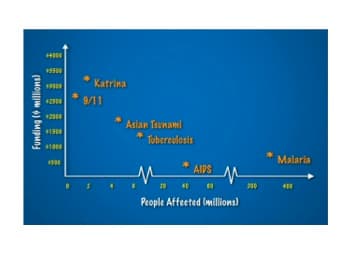People not numbers: emotion not reason
- Written by
- Charlie Hulme
- Added
- March 16, 2012

A sparrow knocked over 23,000 dominoes, spoilt a world record attempt and was shot dead. Public outrage was swift and a tribute website immediately attracted more than 24,000 hits.
Ok, but why does the fact that around 150-200 species are made extinct everyday not evoke the same reaction? What did the martyred sparrow have that countless extinct species did not?
An identity.
Why’s that so important? There are four main reasons…
1. Giving isn’t rational

If big numbers motivated us to take action, if the decision to support a charity was rational, then every child in the world would already have been fed. We wouldn’t have needed a Live Aid 2; Comic Relief would have been a one-off event.
Today a slew of neuroscientists like Gerald Zaltman are proving what savvy marketers have always known: that giving is not arational choice, that 95 per cent of human thought and emotion happens without our conscious awareness.
Want proof? Paul Slovic ran a test offering people the following choice:
- Give $10 million to fight a disease claiming 20,000 lives and save 10,000.
- Give $10 million to fight a disease claiming 290,000 lives and save 20,000.
The first option won!
Want further proof?
3. I am not a number!

Slovic refers to statistics as ‘human beings with the tears dried off’, saying that ‘…numbers fail to spark emotion or feeling and thus fail to motivate action.’ Why? Because when large losses of life are represented simply as numbers we lose any sense of individuality, identification and empathy.
How can you picture ‘millions’ dying; it’s a fact but how can you feel it? Another test gave people the following options…
- To feed a starving girl in Mali named Roika.
- To help millions of hungry children.
Roika was given double the amount given to the millions of children (a further test putting Roika in a statistical context had a negative effect on giving).
4. Stories are memorable

If history were taught in the form of stories, it would never be forgotten. Rudyard Kipling.
Eight million children under the age of five needlessly died last year and we don’t know their names – yet we all vividly remember the faces of Madeleine McCann and Baby P.
A story is memorable; a series of statistics isn’t. If you want people to tell others about your cause it helps if they can remember it.
Which is more memorable?
Charity X was founded in 1996. We work in 114 countries, 365 days of the year. In the last 12 months we provided life-saving vaccinations to 545, 115 children.
Or
Your gift meant Sally got the vaccination that saved her life.
Conclusion?
The key to action is not thoughtful deliberation; it’s emotion.
If you want supporters to engage, take action and spread the word then the identified individual victim, with a face and a name, has no peer. Countless psychological experiments demonstrate this clearly, but we all know it as well from personal experience and media coverage of heroic efforts to save individual lives (we’ll examine this last point in more detail next time).
When telling your story, focus on a single, identifiable individual who personifies your cause. As Dan Ariely puts it, if someone activates our emotions ‘we get to care’. Use their story to show a supporter what they can do.
Back to our martyred sparrow - the head of the Bird Protection Agency said
‘I just wish we could channel all this energy that went into one dead sparrow into saving the species’.

© Charlie Hulme 2012.

















